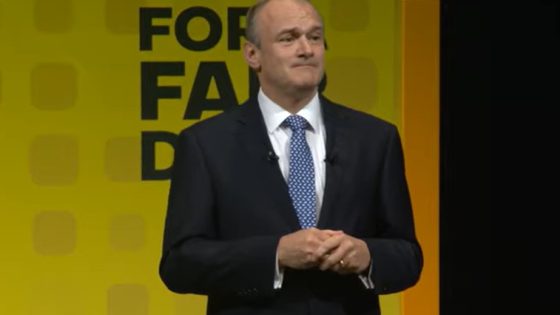Lib Dems promise two-month cancer treatment guarantee

The Liberal Democrat leader, Sir Ed Davey, has pledged to introduce a new legal right for cancer patients to start treatment within two months of an urgent referral, should his party win the general election.
The pledge formed part of his speech at the Liberal Democrat party conference, where he laid out polices that will feature in their election campaign, including on workforce, mental health and social care.
The biggest policy announcement was the party’s two-month cancer treatment guarantee, which comes as part of a five-year plan to boost survival rates.
“It falls to us to rescue the NHS, and make sure everyone can get the care they need, when they need it”
Sir Ed Davey
Sir Ed gave a very personal anecdote during his closing speech at the conference, which took place in Bournemouth this week, about how he lost both his parents to cancer when he was a child.
“My family’s story isn’t unique: there are millions of us whose lives get turned upside down by cancer,” he said.
He noted that it was the job of a government to ensure that cancer is being diagnosed as early as possible.
However, he accused the Conservative Party of abandoning plans for a 10-year cancer plan and missing every one of its waiting time targets for cancer.
Sir Ed said: “I know there are MPs in every party who have lost loved ones to cancer like I did, or who’ve battled it themselves.
“So I fervently hope we can build a consensus across politics to make cancer a top priority in the next parliament.”
The Liberal Democrat leader went on to criticise further government approaches on key issues within the health sector, warning that the Conservatives had “broken promise after promise on the NHS”.
In its recently published plan, the Liberal Democrats have pledged to ensure everyone can get an appointment when they need one, and any crucial treatment should they need that too.
As part of this, they have promised to recruit, train and retain more doctors and nurses to fill the thousands of vacancies in the NHS and cut waiting times.
In addition, they said they will train more GPs as part of plans to give everyone the right to see their GP within seven days, or 24 hours if it is urgent.
Meanwhile, they have also promised to invest in public health and prevention, put mental health on the same footing as physical health and reform dentistry and ambulance services.
“There are so many parts of our NHS plan that would both treat people better and boost our economy,” said Sir Ed.
He added: “It falls to us to rescue the NHS, and make sure everyone can get the care they need, when they need it.
“We know it won’t be easy, but we see a bright future for the NHS. Not because we are blind to the scale of the crisis, but because we are clear-eyed about the solutions.”
Sir Ed also highlighted that the crisis in the NHS was “inextricably linked” to the crisis in social care.
“NHS leaders will welcome the emphasis the Liberal Democrats are putting on health in their general election campaign”
Dr Layla McCay
As a result, the Liberal Democrats have pledged to hire more social care staff, provide them with training and advancement and pay them a higher wage.
In addition, they have promised to increase the carer’s allowance and introduce a statutory guarantee of regular respite breaks for unpaid carers.
Sir Ed said: “Our plan for social care and family care is a central part of our plan for the future health service. And remember – in turn, health and care both are key parts of our plan for the economy.”
Responding to the speech, the deputy chief executive at NHS Providers, Saffron Cordery, said: “The leader of the Liberal Democrats rightly acknowledges that improvements to the NHS and social care are long overdue.
“For too long, patients have been paying the price for chronic underfunding and under-resourcing of the health and care system.”
Ms Cordery welcomed plans to end cancer delays, but said the ambition would “only bear fruit if properly resourced”. She added: “We welcome their commitment to reforming social care.
“Until the sector is put on a sustainable footing, and care workers are appropriately rewarded for the vital work they do, challenges for the whole health and care system will continue to pile up,” she said.
The NHS Confederation’s director of Policy, Dr Layla McCay, also welcomed the policy pledges, but warned that it was unclear how they would be implemented amid the workforce crisis in the NHS.
However, she added: “NHS leaders will welcome the emphasis the Liberal Democrats are putting on health in their general election campaign and we look forward to seeing more of their proposed policies.”
The rest of the UK’s political parties will host their party conferences in the coming weeks, with the Conservative Party conference kicking off this Sunday.
They have a greater significance this year for setting policies and manifestos, given that the next general election is on the horizon.
The maximum term of a parliament is five years from the day on which it first met and the current one first met on 17 December 2019.
As a result, the next general election has to be called by the government by 17 December 2024 and, with a few weeks of campaigning to follow, can be held no later than 28 January 2025.






